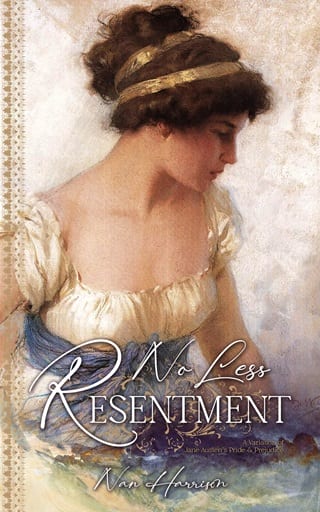Chapter 17
CHAPTER SEVENTEEN
I t was a longer walk to Oakham Mount than Elizabeth remembered, having last taken the path almost two years before. She still knew the way, however, even though the sun was still low in the eastern sky. She had walked out early to avoid meeting any of her neighbours along the way, though few ever made the effort to climb the steep, uneven path even on fine days. Oakham Mount had always been her place to think and work her way through any dilemma, and as she reached its summit, her thoughts became clearer.
"I am not a marrying sort of man."
She knew of such men even though she probably should not. She was conversant in the ways of the ancient Greeks, of course, not to mention her perusal of some books her father thought were hidden away. She found that this did not frighten her. The captain had been completely open with her even though it was difficult and dangerous for him. She valued his trust.
His enemy had searched for evidence to use against him and had discovered some rumours from long ago. To protect his career, indeed to save his own life, Captain Bancroft needed evidence to rebut the allegation, if indeed the threats were carried out. Could she act as his evidence?
Apparently, Captain Bancroft had been quite impressed with her when they had spent much of Kitty's wedding breakfast conversing. Her delight in his sea stories had made him sense a spirit of adventure within her, and he had noted her quick intelligence. He needed a wife, though in name only, and she was his choice.
But to give up everything she knew in such an irreversible way, just to help a man she hardly knew who had been threatened by someone more powerful? An awful notion gripped her. She had responded with such sympathy to Mr Wickham's lies about Mr Darcy. Was she being fooled again?
After thinking on it, she decided that she was not. Mr Darcy had wounded her confidence, and Mr Wickham's easy charm had been a balm to those wounds. Captain Bancroft was a good man—a serious, courageous, and honourable man; blunt, honest, and far, far from charming.
Her father had shared with her the letter Mr Gardiner had sent. Her canny uncle approved of the captain, though he had a concern about the age difference. Her uncle's acquaintance was wide and varied, his connexions were myriad, and he knew how to get information. Mr Gardiner had investigated him and found nothing but respect and admiration among other naval men. There had not been the faintest whisper of anything scandalous. And she had already witnessed for herself how the captain had cared for the Newfield family after Lieutenant Newfield had been lost in battle.
What a lonely sort of life he has lived , Elizabeth mused. Suddenly, a fragment of a half-remembered conversation surfaced in her mind. "There were…those rumours, you know…years ago. Before I married Dorothy. I cannot take the risk that the old gossip might be dredged up again." She gasped and sat up straight. Quiet, kind, intelligent Uncle Philips, married to a loud, stupid, vulgar woman like her aunt. She had heard once that he had been a promising young barrister in London but had chosen the quiet life of a village solicitor. Perhaps not chosen but had been driven to it. Poor Uncle!
Her sisters had all married men they had not been acquainted with for long. They seemed to be successful unions. Jane was an equal partner with Alexander, who loved and respected her for her mind and talents, not just her beautiful face. Mary had found happiness with Gerhard, who had opened up her ability to find joy in music and humour in life. Kitty not only loved Henry, who respected her intelligence, but she was finally receiving the maternal love and guidance that their own mother had never been able to give all her daughters in equal measure.
And now there was Captain Bancroft, this quiet man who had spent his life fighting battles in both external and internal ways. Could she accept him? Give up everything she knew, leave everyone she loved, and follow a relative stranger around the world? Could she go with this man and have no hope of putting distance between them if the union did not go well? She would be confined to a small wooden ship, a speck in the middle of the endless sea, with no way of escape.
It would be a classic case of Charlotte's assertion that it was best to know as little as possible of the defects of the person with whom you are to pass your life. Elizabeth shuddered, thinking of what her old friend might have since discovered about Mr Collins.
Elizabeth had not taken her turn in London. Should she now, rather than marrying the captain, go to live in the house on Gracechurch Street? How long would it be until she was introduced to eligible businessmen or lecturers or barristers? They would all be good men. Would it be enough for her to marry one of those men and have a pleasant house with pleasant children in a pleasant part of town? Was that her only alternative?
She had never experienced romantic love, though she had witnessed the damage caused by unrequited love and incompatible pairings. She had never felt a profound physical attraction to any particular man, though she had always admired masculine faces and forms. She had always imagined herself as an aunt more so than a mother. I cannot miss what I have never experienced.
If she married Captain Bancroft, what other experiences might be in store for her! She had always wished to see more of the world, the places with exotic names she had seen on her father's globe and read about in his books. Was this her test, her chance to discover what she was capable of?
The thought was exhilarating and roused her to more anticipation and optimism than she had ever felt before. This must be why some people gamble. For it was indeed a gamble, betting her life, her future, everything she was, on a throw of the metaphorical dice.
She closed her eyes and took a deep breath, then let it out slowly. She had come to a decision.
A few days later, Elizabeth and her father were in their accustomed places in his study. "My child, you seem to attract silent, taciturn men," Mr Bennet said as he set aside the settlement papers.
She blinked at him. "Whatever do you mean, Papa?"
"Captain Bancroft is quiet and reserved, to the point of seeming stern. In fact, if one was not acquainted with him, one would never know of his other outstanding qualities. His courage and leadership, his kindness and generosity. He even has an excellent sense of humour, but it is well hidden. I can think of one other such man who was attracted to you, whom we never did become truly acquainted with."
"And who would that be?" she asked, genuinely confused.
"Mr Darcy," her father said with a smirk.
"Mr Darcy!" She stared at him in disbelief and then laughed. "Papa, he only ever looked at me to catalogue my faults! I am certain he had a long list. Perhaps he ran out of paper, and that is why he hurried back to town so precipitously!"
They laughed together, then Mr Bennet spoke. "When a gentleman admires a lady, he watches her. He cannot help but look at her. He cannot turn away, even to the point of rudeness. We shall never know about Mr Darcy, and it does not matter, since we shall never see him again, but it is my opinion that he admired you but thought himself too far above us to act upon it."
He took up the settlement contract again and signed it. "I shall miss laughing with you as we do today, but I believe you have made a good decision. You will live a difficult life, but one with many rewards."
Suddenly, a thought seemed to strike him. He pulled open a drawer, rummaged around in it for a short time, and pulled out a long wooden box. He handed it to Elizabeth. She looked at him and then opened it. It was a brass telescope, one that could be adjusted by turning. She removed it from the box and turned it over in her hands, studying it. Then she looked at him questioningly.
Mr Bennet enlightened her. "It belonged to my father. Although he never went to sea, he studied the stars. I would like you to watch the stars for me. Write to me and tell me where you are when you can no longer see the North Star and when you begin to observe the southern constellations that we cannot see from here. Keep a journal of what you see." He rose and pulled some leather-bound books from a stack on a bookcase. "Here are some notebooks to use on your journey. I know you will write to me, and I shall make the attempt to be a faithful correspondent as well."
 Fullepub
Fullepub 



